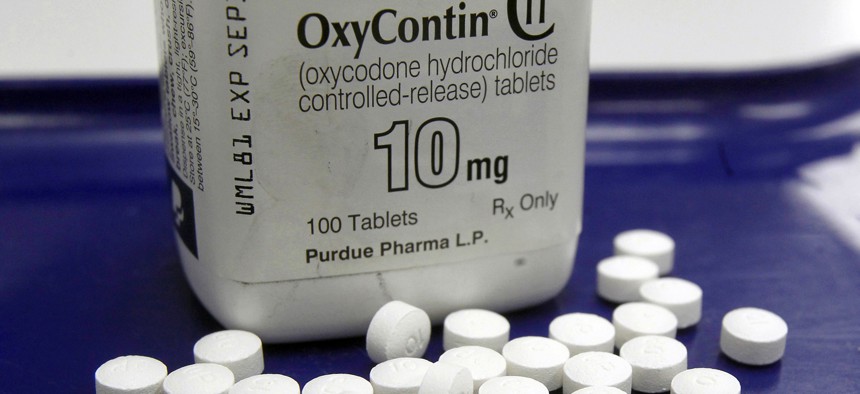47 States Reach $573 Million Opioid Settlement with McKinsey

This Feb. 19, 2013, file photo shows OxyContin pills arranged for a photo at a pharmacy in Montpelier, Vt. AP Photo/Toby Talbot
States will receive the majority of the money they are owed from the consulting firm within 60 days.
Consulting company McKinsey and Co. has agreed to pay $573 million to resolve investigations into its role promoting prescription opioid sales for drug companies—with the bulk of the settlement money headed to states in the next two months.
McKinsey worked with Purdue Pharma, the manufacturer of OxyContin, for 15 years to help market the drug and “turbocharge” sales, said North Carolina Attorney General Josh Stein in a press conference held Thursday.
Of the settlement, $558 million will be divided among the 47 states, Washington, D.C. and five territories that participated in the litigation and $15 million will go to the National Association of Attorneys General to cover litigation-related costs. Most of the settlement must be paid out to states within 60 days. States will use the money to cover opioid treatment, prevention and recovery programs.
States will have a “wide range of options” when it comes to using the money, said Stein, who helped lead negotiations among state attorneys general on the deal. Permissible uses could include funding for treatment centers or covering the cost of emergency response to overdose calls, said Stein, whose own state will receive approximately $19 million.
“We are going to work with leaders across the state to use those funds to deal with the consequences of the crisis,” he said.
The deal represents the first opioid-related settlement for states since Purdue Pharma agreed to an $8.3 billion settlement with the Department of Justice last year. But Purdue declared bankruptcy and disagreements among state and local governments over how to use opioid settlement funds have hamstrung efforts to distribute awards.
As part of the settlement, McKinsey can no longer work for prescription opioid businesses and the company must also produce and make public thousands of internal documents that detail its work for Purdue and opioid companies.
“Today’s agreement sets a new standard for accountability in one of the most devastating crises of our time,” said Massachusetts Attorney General Maura Healey in a statement.
Sales of prescription opioids skyrocketed in the United States in the 1990s, fueling the ongoing addiction crisis. As regulators began to crack down on the prescribing of opioids, use of heroin and later synthetic opioids grew and the number of fatal overdoses involving those drugs increased. Nearly 50,000 people died of opioid overdoses in 2019.
McKinsey advised Purdue how to maximize the drug company’s profits from prescription opioids, according to court documents filed in the case. As part of its marketing efforts, McKinsey told Purdue to target high-volume opioid prescribers, use specific messaging to get physicians to prescribe more OxyContin to more patients, and to work with mail-order pharmacies to circumvent retail pharmacies’ restrictions on high-dose prescriptions.
In a statement, McKinsey said it hopes “to be part of the solution to the opioid crisis in the U.S.”
“We deeply regret that we did not adequately acknowledge the tragic consequences of the epidemic unfolding in our communities,” said Kevin Sneader, the company’s global managing partner.
Nevada, Washington and West Virginia were not among the 47 states that signed on to the agreement. Washington and West Virginia announced their own deals with McKinsey. Washington will receive $13 million and West Virginia will receive $10 million.
Andrea Noble is a staff correspondent with Route Fifty.
NEXT STORY: Toward a More Inclusive and Resilient Economic Development Paradigm





